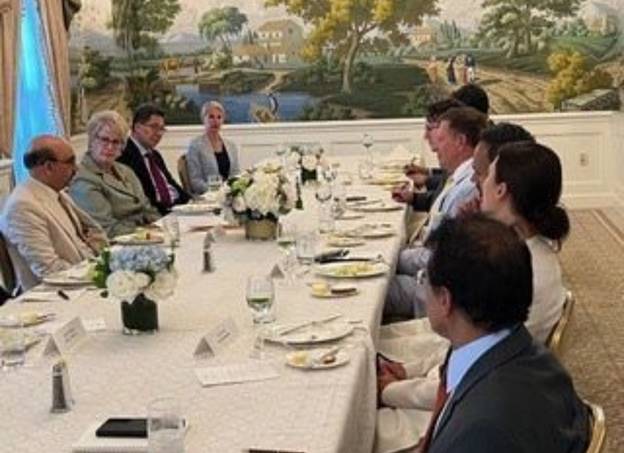
Underlining that Pakistan was by far one of the most consequential countries in the West Asian hemisphere, Ambassador Khan highlighted the human potential of the country and the massive transformation of the economy towards digitization and e-commerce that was connecting its tech-savvy youth with new technologies
Ambassador Masood Khan Urges American Businesses to Increase Investment in Pakistan
By Elaine Pasquini

Washington: “Over the decades, Pakistan’s market has remained lucrative and attractive for American businesses,” Masood Khan, Pakistan’s Ambassador to the United States, told American corporate leaders, entrepreneurs, and business executives in a June 24, 2024, meeting in Washington, DC. “Eighty-three US companies have invested over $1.5 billion in Pakistan and are generating revenues of $3 billion according to the American Business Council.”
This data shows that the United States has a “sturdy and elaborate investment infrastructure in Pakistan and its companies are fully familiar with the business ecosystem in Pakistan,” he added.
Briefing the attendees in detail about various incentives that were being offered by the government in all sectors of investment, he related that the US International Trade Administration identifies several advantages for American investors in Pakistan, including the absence of shareholding restrictions, simple work permit regulations, no technology transfer requirements and a large and sophisticated entrepreneurial community.
Pakistan’s Special Investment Facilitation Council was established a year ago to fast-track approvals, eliminate cumbersome bureaucracy and “facilitate foreign inflows” particularly into new investments in the IT, energy, agriculture and minerals sectors, Ambassador Khan told the gathering.
Highlighting that Pakistan is the fourth largest freelance provider in the world with over 20,000 information and communication technology (ICT) registered companies, the ambassador noted that the IT sector, especially tech startups, was fast becoming a growth industry in Pakistan. He also projected the power sector as another priority area as the country wanted to double its energy production from the current level of 45,000 MW in a decade and make a fast transition to renewables.
Pakistan’s treasure trove of minerals that include copper, gold, lead, zinc, iron ore, coal, lithium, rare earth, cobalt, aluminum, chromite, and nickel are exciting investment opportunities for US entrepreneurs, the ambassador pointed out.
“Pakistan is developing the human capital and expertise for manufacturing semiconductor chips for application in various electronic and generative AI-supported devices,” he said. “Our lithium reserves, a key ingredient for battery production, would contribute to future sustainable energy solutions.”
In addition, Pakistan is in the process of modernizing its agricultural sector to increase the yields of wheat, rice, cotton, lentils, and soybeans through the development of climate-resistant hybrid seeds, he added.
One positive aspect of Pakistan and US relations, he noted, is the successful recalibration of their ties in the past two years with the development of a road map for cooperation in both the security and non-security realms. The two countries have held several rounds of consultations to also give a fresh impetus to their defense cooperation. “We hope that the approvals for sustainment of American-origin defense platforms would come forth soon leading to full restoration of foreign military financing and foreign military sales,” he said.
Noting that collaboration between the United States and Pakistan was moving quickly in the areas of climate change, energy, healthcare, education, science, technology, trade, and investment, the ambassador said that efforts were afoot to hold a comprehensive economic dialogue to spur growth and build more long-term resilient relations that directly benefit the peoples of the two countries.
The Pakistan-US trade volume stood at US $10.6 billion in 2022-2023, inclusive of services, with Pakistan’s exports totaling $8.4 billion, making the US the largest export destination for Pakistan, he said.
Underlining that Pakistan was by far one of the most consequential countries in the West Asian hemisphere, Ambassador Khan highlighted the human potential of the country and the massive transformation of the economy towards digitization and e-commerce that was connecting its tech-savvy youth with new technologies.
(Elaine Pasquini is a freelance journalist. Her reports appear in the Washington Report on Middle East Affairs and Nuze.Ink.)

